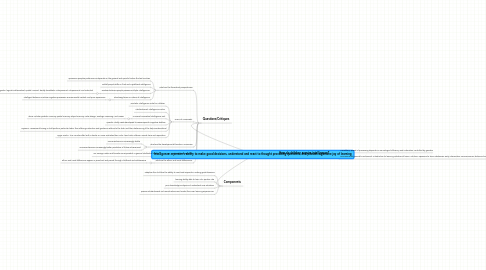
1. Components
1.1. adaptive-the child has the ability to react and respond in making good decisions
1.2. learning ability-able to learn at a quicker rate
1.3. prior knowledge-analyze and understand new situations
1.4. passion-students seek out new situations and create their own learning experiences
2. Questions/Critiques
2.1. What are the theoretical perspectives?
2.1.1. Spearmen-peoples performance depends on the general and specific factors the test involves
2.1.2. Cattell-people differ in fluid and crystallized intelligence
2.1.3. Gardner-believes people possess multiple intelligences
2.1.3.1. 8 Intelligences include linguistic, logical-mathematical, spatial, musical, bodily-kinesthetic, interpersonal, intrapersonal, and naturalist
2.1.4. Sternberg-focus on nature of intelligence
2.1.4.1. Intelligent behavior involves cognitive processes, environmental context, and prior experience
2.2. How is it measured?
2.2.1. Wechsler Intelligence Scale for Children
2.2.2. Stanford-Binet Intelligence Scales
2.2.3. Universal Nonverbal Intelligence Test
2.2.3.1. items include symbolic memory, spatial memory, object memory, cube design, analogic reasoning, and mazes
2.2.4. Specific Ability Tests-developed to assess specific cognitive abilities
2.2.5. Dynamic Assessment-having a child perform particular tasks, then offering instruction and guidance relative to the task, and then determining if the help was beneficial
2.2.6. Apgar Scale-1 to 5 minutes after birth a doctor or nurse evaluates their color, heart rate, reflexes, muscle tone and respiration
2.3. What are the developmental trends in IQ scores?
2.3.1. IQ scores become increasingly stable
2.3.2. IQ scores become increasingly better predictors of future achievement
2.4. Do gender differences exist?
2.4.1. On average males and females are equivalent in general intellectual ability
2.5. What are the ethnic and racial differences?
2.5.1. ethnic and racial differences appear in preschool and persist through childhood and adolescence
